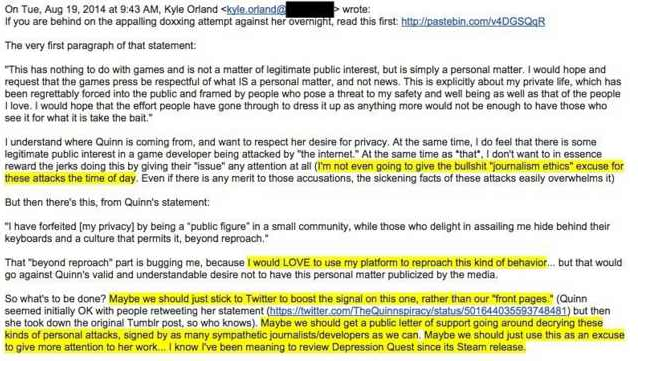
In 2011, Ben Kuchera of Ars Technica wrote a scathing review of Duke Nukem Forever. Ordinarily, a review of this kind would complain about unresponsive controls, dated graphics, poor level design, or an imbalanced difficulty. But Kuchera’s review was largely absent of these rational criticisms. Instead, he chose to focus on the softer elements—the game’s flagrant disregard for restraint and good taste, its “treatment of women as objects”, and its depiction of “toxic masculinity” as a virtue, not a vice. Never mind the heavy level of irony and sarcasm that accompanied Duke’s machismo, irony that frequently made him the butt of jokes more than any other character. No, the ability to shoot alien-infested women (a la, well, Aliens), manhandle excrement and read scandalous magazines were the cardinal sins, demanding the game’s immediate censure and scorn. But these were not the complaints wrought by a puritanical “concerned parents” group. They came from an entrenched leftist, one who, it can be assumed, should have nothing but tolerance for these carnal pursuits. But DNF, by Kuchera’s enlightened standards, was a travesty, not for its technical shortcomings, but its trampling of progressive values in a post-Bush world.
In reality, of course, the passing of time was kind to DNF. Later patches corrected its most glaring flaws, and the game is a creative, if not boorish, achievement, marred only by a short length and some unrealized potential. It may not have been worth 12 years to make, but the result never deserved the level of drubbing it received from critics, Ars Technica among them. And it was Kuchera on the frontlines of this crusade, tearing the game from its throne as though he were the proletariat mob, pulling a statue of the Czar to the plaza cobblestones. Clearly, Duke Nukem Forever represented everything wrong with America, masculinity, and consumer culture. Its release was unconscionable. It, and everything like it, had to be stopped.
Video game journalism had taken a strange turn by 2011. After attempts to legitimize games as “art” fizzled in the late 2000s, outlets like IGN and Gamasutra began to discover their relevancy was dying, and were looking for new voices to provoke controversy and drive traffic. Knowledge of the games themselves had never been an issue, since games “journalism”, like all other consumer literature, is designed to sell product, not to inform. But video games have always been a largely male pursuit, catering to masculine tastes. Those English majors lucky enough to land a job at Ziff Davis Media (EGM, 1up, etc.) were feminists in the egalitarian sense alone. They were not advocates of “difference feminism” (i.e. women require segregation from mainstream culture, laws, etc.), but the ones who’d resisted these voices in their curriculum; if they hadn’t, they would’ve taken jobs in actual journalism, or gone to grad school, where the rewards for giving Marx a fair shake are much higher. Otherwise, they studied media and journalism in the neutral halls of community college, or, in the rarest of cases, actually worked in game design, where they were similarly insulated from feminist voices.
All these factors kept the gaming media away from politics and the wider culture, relegating it to the niche, “enthusiast” crowd. But with services like Steam, Twitter and YouTube, the old guard found their audience shrinking rapidly. The larger players at E3 were going digital, and consumers themselves were now the content creators, through Let’s Plays, Steam reviews, and Twitch streaming. Nobody needed the journos’ help anymore. The answer to this populist empowerment was a last ditch effort to stay relevant—through narrative control. With customers themselves critiquing the technicals, game journalists decided to focus on the meta elements, the thematic content, the grander connections between art and the public square—in other words, things most affected by perception. Psychology and women’s studies majors starting getting jobs within the field, and with them, the whole host of ultra-liberal propaganda they’d absorbed. The actual content of the games barely mattered anymore, and neither did any competency for playing them—narrative control was the primary concern. The first batch of these articles, decrying the lack of “positive female protagonists in gaming”, hit IGN in 2011, just months before Duke Nukem Forever finally released. And when it did, it represented everything the new vanguard personally despised, making it the perfect whipping boy. The scrum was intense, and served to ruin the game’s reputation with barely a foot out of the gate. The gaming media had become the gestapo of consumer culture, branding DNF “degenerate”, to shame developers into never releasing such an abomination again. And with this absorption of leftist rhetoric, the industry took its first step into becoming one more calcified turret of the same ivory tower.
It isn’t surprising that Ars Technica’s senior editor, Kyle Orland, wields influence in the #Gamergate debacle. And the hard evidence unearthed recently only demonstrates the collusion between academia, identity politics, and the game industry, a collusion involving him. From here, we get a glimpse into the groupthink mindset of gaming journos, and the smear campaign against DNF is more fully understood. Orland was part of a Google Group containing hundreds of figures from the tech, education, and political sectors, seeking to shape narratives and alter public perception to favour the left. A sad, petty cabal of would-be “influencers”, blue checkmarks in tow, serving the corporatocracy with the zeal of a seasoned rapist. One has to wonder if they worked for Jack Thompson in the early 00s, the deposed lawyer who vehemently lobbied against violent games. One has to wonder if they’d ever notice the irony. In one particularly damning post, Orland advocates retaliation against the “online trolls” who were, reportedly, harassing Zoe Quinn. He stops short of using his platform, Ars Technica, for the mission, but has no qualms with manipulating the uproar to his colleagues’ advantage.

Note Orland’s passive-aggressive deflection, by making his call to arms look justified – essentially, “I don’t want to give them the time of day, BUT—“. The neurotic virtual signaling is particularly strong here. Orland wants to look like he’s not being petty or retaliatory, by claiming he won’t sink to their level, but then frames his desire to do so by using Quinn’s words. It’s the kind of cowardly, sniveling behaviour any rational person would burn a bridge over, and never look back. Orland and his comrades demonstrate the rotten core of today’s leftist, mainstream media, and their desire to corrupt every venue with their brand of rhetorical poison. The venom against DNF was merely a symptom of an underlying disease. Stonewalling the media to obey only the left is happening in every sector of entertainment, but there is something particularly impotent about Orland and Kuchera’s approaches. Something reeking of self-loathing, the absence of solid values, and the desire to tear down what others have built. Sure, let them wallow in the pit they’ve dug. But so long as it remains, it stands to us to warn others of where it is, and who the wallowers are.

Hey man good article. I’m getting sick of these ideologues taking fun things and threatening the creator into submission. why cant entertainment just be entertaining anymore?
Ars Technica has become a echo chamber for the left.
It is not like I’m on the right; it is just that they have found that anything right of center is to be censored out of comments and perpetual right of center posters are just banned.
They used to be, what I considered, the last bastion of unbiased tech and they, now, prostitute themselves to an eccentric POV.
Not to mention the prostitution of “articles” that are flat out advertisements.